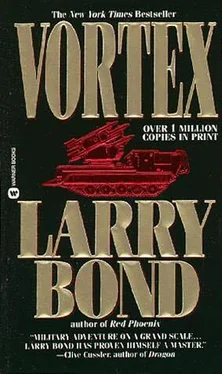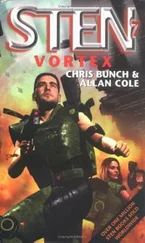“Acknowledged, Captain. Keep me posted. Out.” Col. Raoul Valladares slipped the headset off and tossed it back to a yawning radioman.
“Well?” Gen. Carlos Herrera glared at his trim, dapper subordinate while he struggled into his jacket and strained to button his tunic collar.
Unfortunately, not even the most creative military tailor could design a uniform that made the general look anything less than grossly overweight. Spiky tufts of black hair sticking straight up offered clear proof that Heffera had been sound asleep when the shooting started.
“Nothing more than an outpost skirmish, Comrade General.” Valladares ran lean fingers through his own tousled hair.
“One of our sentries thought he saw movement and opened fire.”
Herrera grunted sourly and left his collar hanging open. He moved closer to the situation map and stood frowning at the portrait it painted.
Valladares understood his commander’s irritation. In the first four days of Vega’s offensive, the Second Brigade Tactical Group had driven deep into the eastern Transvaalplowing forward more than one hundred kilometers through the low veld’s orange groves and banana plantations.
But the past day’s progress had been painfully slow and costly as the brigade’s tanks and infantry fought their way up steep hills and across rugged river gorges on a front sometimes only one road wide.
The colonel shook his head wearily. They’d planned to punch through the two-thousand-foot-high escarpment separating the low veld from the high veld before the South Africans could mount an effective defense.
Crystal-clear hindsight showed how wildly optimistic they’d been. Even a small number of determined defenders can delay an attacker advancing through rough country. And the South Africans were nothing if not determined.
They’d probed and harassed the oncoming Cuban column at every opportunity. An ambush here. A stoutly defended roadblock there. No major engagements. No set-piece battles that would allow the brigade to use its superior firepower. Just a never-ending series of skirmishes that left one or two men dead, several others wounded, one or more vehicles in flames, and slowed the Cuban advance to an anemic crawl.
Not that General Vega was displeased, Valladares knew. Even though its daily gains were now measured in kilometers instead of tens of kilometers, the Second Brigade Tactical Group was still advancing-still drawing South African troops away other fronts. His eye fell on a red arrow designating the third of Vega’s attacking columns. Transshipped by rail the long way round through neutral Botswana, the Third Brigade had shot its way onto South African territory three days after its two counterparts.
This third Cuban column was driving hard-advancing east rapidly against weak opposition. Confronted by two more immediate threats to its vital northern and eastern Transvaal mining complexes, Pretoria had stripped its border with Botswana of almost every trained man able to bear arms.
Exactly as Vega had planned.
NOVEMBER 20-THIRD BRIGADE TACTICAL GROUP, NEAR BODENSTEIN, SOUTH
AFRICA
Dozens of Cuban armored cars, APCs, and self-propelled guns rolled steadily eastward along a two-lane paved highway. The sun stood high overhead, beating down mercilessly on grasslands just starting to turn from yellow-brown to a lush, rich green. Wisps of dark cloud on the far horizon hinted at the possibility of more rain later in the day or evening.
Four BRDM-2 scout cars led the column, their turrets spinning continuously from side to side as gunners sought out potential targets. Scouts who grew sloppy and complacent were scouts who were soon dead.
So when the lieutenant commanding the lead BRDM saw movement in a clump of brush just off the road, he didn’t hesitate before screaming a shrill warning. The heavy machine gun in the scout car’s turret was already firing as it slewed on target. And more than a hundred rounds of 14.5mm machinegun ammunition slammed into the patch of brush.
The scout car and its companions swept on past in a swirl of dust and torn vegetation.
Ten minutes later, the first BTR-60 troop carriers thundered by. Cuban infantrymen riding with their hatches open turned curious eyes on the site of the attempted ambush. Two old men dressed in ill-fitting South African uniforms lay bloody and unmoving, entwined around a dull-gray metal tube-an ancient World War II-era bazooka.
The road to the small fanning town of Bodenstein lay open and undefended.
And Cuba’s Third Brigade Tactical Group was just one hundred and seventy kilometers from Johannesburg.
NOVEMBER 21STATE SECURITY COUNCIL CHAMBER, PRETORIA
Fear has its own peculiar smell-the sour stench of sweat triggered by sheer, gut-twisting panic and not by hard manual labor.
It was an odor Marius van der Heijden knew well. As a young policeman and later a senior security official, he’d smelled fear in dozens of small, sterile interrogation rooms. He’d witnessed the terror of men confined in brutal prisons or awaiting death on a gallows.
But now he caught its unmistakable scent in a room full of South Africa’s self-proclaimed leaders. The men seated around Karl Vorster were, quite plainly, frightened almost out of their wits.
The arrows and lines drawn on the large map at one end of the room explained their growing panic.
“in sum, Mr. President, we face an impossible military situation.” Gen.
Adriaan de Wet looked haggard and worn, aged beyond his years by a series of unprecedented disasters.
“We simply do not have the manpower or equipment to hold Namibia, crush local rebellions, and fend off this
Cuban offensive. It cannot be done.” His hand shook as he tried to hold the map pointer steady.
Van der Heijden listened with a sinking heart. The battalions rushed back from Namibia to face the Cuban columns driving on Pietersburg and
Nelspruit were fighting hard, slowing the enemy’s advance. But they were being destroyed in the process. Reinforcements and replacements sent to them were swallowed up within hours.
Even worse, the SAD IF had almost nothing left to throw at the third Cuban invasion force-now within one hundred and fifty kilometers of
Johannesburg. Many of the Afrikaners who’d rebelled against the government were returning to the fold-willing to bury their own grievances to fight a foreign enemy. But it was all too little and too late, Hastily assembled task forces made up of understrength infantry companies, ill equipped commandos, and outdated artillery pieces had either been smashed to pieces or swallowed whole. South Africa’s back door was wide open.
De Wet finished his grim briefing and stepped away from the situation map.
Every head swiveled toward the dour-faced man seated at the head of the table. But as always of late, Karl Vorster sat silent and unapproachable.
An uncomfortable silence dragged. De Wet shifted his pointer nervously from hand to hand.
Finally, Fredrik Pienaar, the minister of information, waved a thin, bony finger at the map.
“What about the troops garrisoning Voortrekker Heights and other bases? Can’t they be used to defeat this third Cuban force?”
De Wet shook his head.
“Most of those battalions are badly understrength themselves. And they’re needed to defend vital installations in and around
Pretoria against possible guerrilla attack. We can’t afford to fight one fire by leaving our enemies free to set others.”
Heads around the table nodded in hurried agreement. De Wet’s definition of “vital installations” included their own homes and offices.
Pienaar reddened.
“Very well, General. Then what about the rest of our army? What about the troops and tanks you’ve managed to leave dangling uselessly in Namibia?”
Читать дальше












